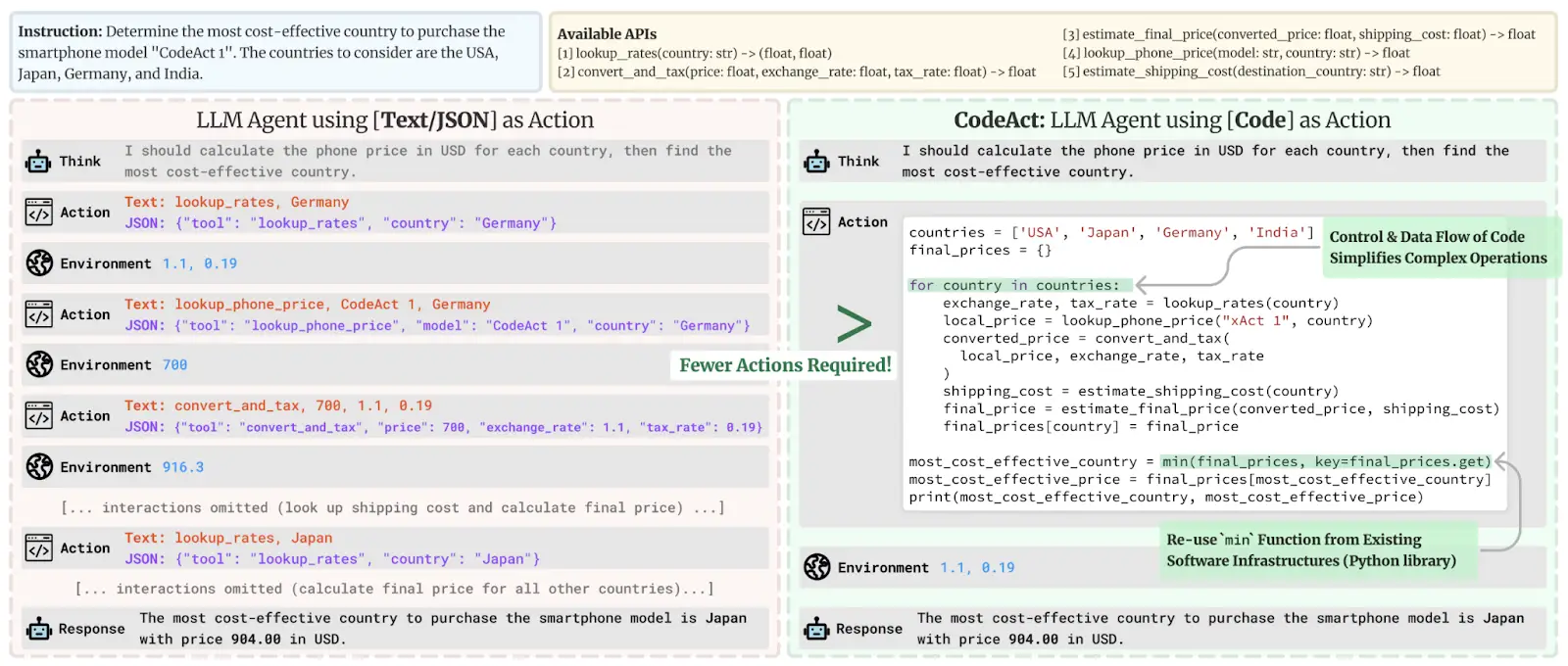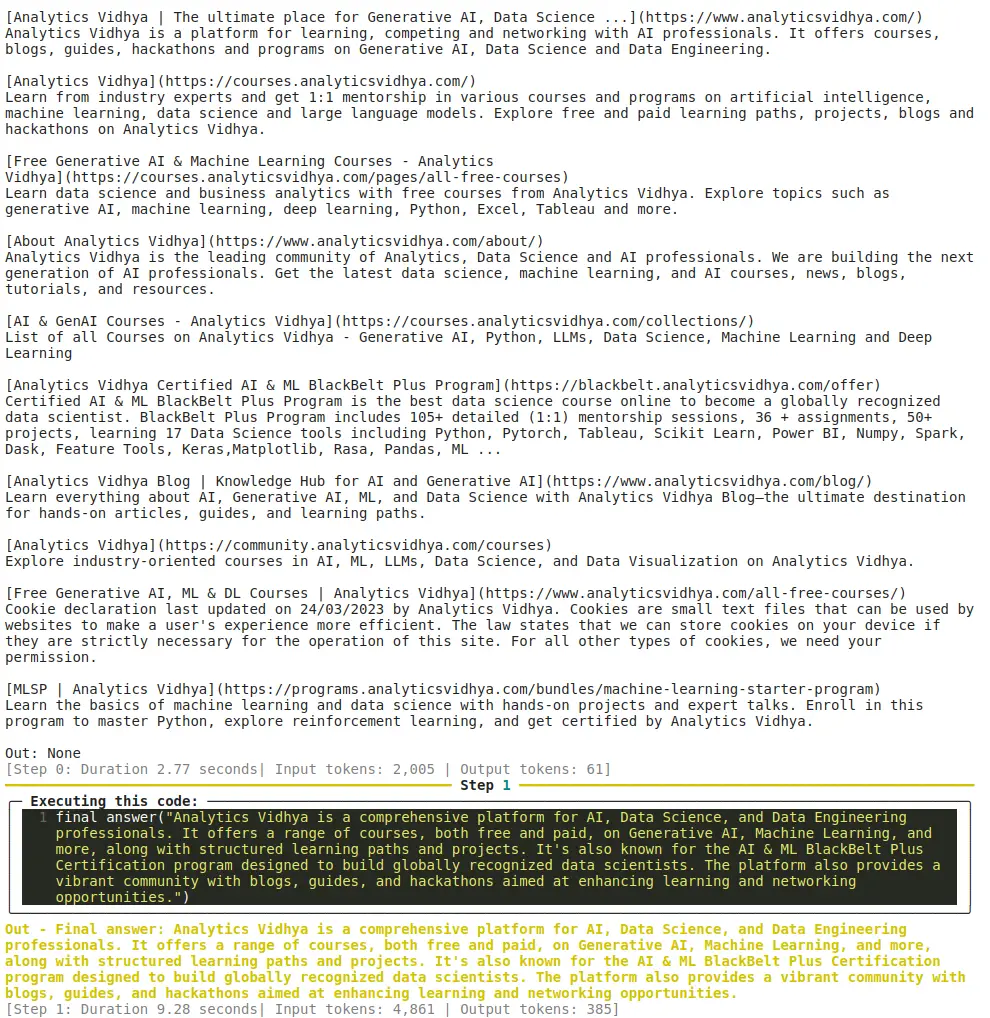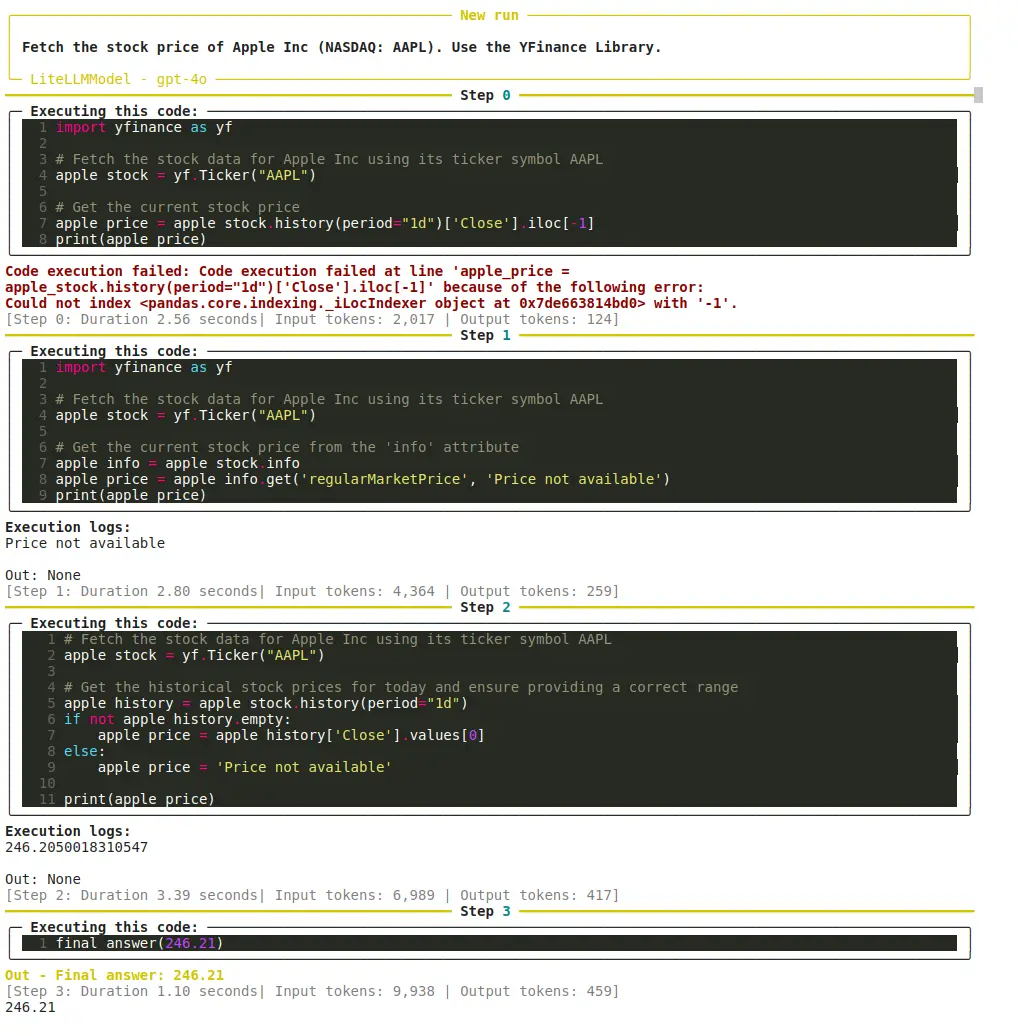SmolAgents by Hugging Face: Build AI Agents in Under 30 Lines
Happy New Year! My exploration of AI Agents in 2025 led me to Hugging Face's SmolAgents framework. Let's dive in!
Hugging Face's SmolAgents library, launched in 2025, simplifies running powerful agents with minimal code. Its ease of use, Hub integrations, and broad LLM compatibility make it ideal for agentic workflows.
Table of Contents
- What is SmolAgents?
- Understanding AI Agents
- Multi-step Agent Example
- SmolAgents Key Features
- SmolAgents Capabilities:
- Code Agents
- Local Python Interpreter
- E2B Code Executor
- SmolAgents in Action:
- Demo 1: Research Agent
- Demo 2: Stock Price Retrieval
- Conclusion
What is SmolAgents?
SmolAgents is a concise, powerful library for building and running agents. Its compact design (around 1,000 lines of code) prioritizes ease of use without sacrificing functionality. It excels at supporting "Code Agents," which generate and execute code, and offers enhanced security via sandboxed environments like E2B. It also supports traditional ToolCallingAgents using JSON or text-based actions. SmolAgents integrates with various LLMs (Hugging Face Inference API, OpenAI, Anthropic, etc. via LiteLLM) and a shared tool repository on the Hugging Face Hub.
Understanding AI Agents
AI Agents are autonomous systems performing tasks on behalf of users or other systems. They achieve this by orchestrating workflows and using external tools (web searches, code execution, etc.). LLMs power these agents, integrating tool usage for real-time information. Essentially, they bridge LLMs and the external world, enabling action and decision-making. Agency exists on a spectrum, with LLMs having varying degrees of control over system actions.
| Agency Level | Description | Name | Example |
|---|---|---|---|
| ☆☆☆ | LLM output has no impact on program flow | Simple Processor | process_llm_output(llm_response) |
| ⭐☆☆ | LLM output determines an if/else switch | Router | if llm_decision(): path_a() else: path_b() |
| ⭐⭐☆ | LLM output determines function execution | Tool Caller | run_function(llm_chosen_tool, llm_chosen_args) |
| ⭐⭐⭐ | LLM output controls iteration and program continuation | Multi-step Agent | while llm_should_continue(): execute_next_step() |
| ⭐⭐⭐ | One agentic workflow starts another | Multi-Agent | if llm_trigger(): execute_agent() |
Multi-step Agent Example

Agents handle complex tasks by using multiple tools and adapting to different situations. Unlike traditional programs with rigid workflows, agents manage complexity and unpredictability more effectively.
SmolAgents Key Features
For simple tasks, custom code suffices. However, for complex behaviors (tool calling, multi-step agents), SmolAgents provides essential structure:
- Tool Calling: Agent output follows a specific format (e.g., "Thought: Use 'get_weather'. Action: get_weather(Paris).") processed by a parser. The system prompt guides the LLM on this format.
- Multi-step Agents: LLM prompts are tailored based on previous iterations, requiring memory for context.
SmolAgents integrates these components seamlessly: LLM, tools, parser, system prompt, memory, and error handling.
SmolAgents Capabilities
Code Agents
Using code (instead of JSON) for tool actions is superior due to its efficiency, composability, object management capabilities, generality, and compatibility with LLM training data.

Local Python Interpreter
The CodeAgent uses a secure LocalPythonInterpreter with controlled imports, operation limits, and predefined actions.
E2B Code Executor
For enhanced security, SmolAgents integrates with E2B for sandboxed code execution.
from smolagents import CodeAgent, VisitWebpageTool, HfApiModel
agent = CodeAgent(tools=[VisitWebpageTool()], model=HfApiModel(), additional_authorized_imports=["requests", "markdownify"], use_e2b_executor=True)
agent.run("What was Abraham Lincoln's preferred pet?")SmolAgents in Action
Demo 1: Research Agent
!pip install smolagents
from smolagents import CodeAgent, DuckDuckGoSearchTool, HfApiModel
model = LiteLLMModel(model_, api_key="YOUR_API_KEY") # Replace YOUR_API_KEY
agent = CodeAgent(tools=[DuckDuckGoSearchTool()], model=model)
agent.run("Tell me about Analytics Vidhya")
Demo 2: Stock Price Retrieval
!pip install smolagents
import yfinance as yf
model = LiteLLMModel(model_, api_key="YOUR_API_KEY") # Replace YOUR_API_KEY
agent = CodeAgent(tools=[DuckDuckGoSearchTool()], additional_authorized_imports=["yfinance"], model=model)
response = agent.run("Fetch the stock price of Apple Inc (NASDAQ: AAPL). Use the YFinance Library.")
print(response)
Conclusion
SmolAgents simplifies AI agent development. Its key strengths are simplicity, versatility, security, the use of code for tool actions, and its integrated ecosystem. It's a valuable tool for building adaptable and scalable agentic systems. Consider exploring the Agentic AI Pioneer Program for deeper insights.
The above is the detailed content of SmolAgents by Hugging Face: Build AI Agents in Under 30 Lines. For more information, please follow other related articles on the PHP Chinese website!

Hot AI Tools

Undresser.AI Undress
AI-powered app for creating realistic nude photos

AI Clothes Remover
Online AI tool for removing clothes from photos.

Undress AI Tool
Undress images for free

Clothoff.io
AI clothes remover

Video Face Swap
Swap faces in any video effortlessly with our completely free AI face swap tool!

Hot Article

Hot Tools

Notepad++7.3.1
Easy-to-use and free code editor

SublimeText3 Chinese version
Chinese version, very easy to use

Zend Studio 13.0.1
Powerful PHP integrated development environment

Dreamweaver CS6
Visual web development tools

SublimeText3 Mac version
God-level code editing software (SublimeText3)

Hot Topics
 1655
1655
 14
14
 1414
1414
 52
52
 1307
1307
 25
25
 1253
1253
 29
29
 1227
1227
 24
24
 Getting Started With Meta Llama 3.2 - Analytics Vidhya
Apr 11, 2025 pm 12:04 PM
Getting Started With Meta Llama 3.2 - Analytics Vidhya
Apr 11, 2025 pm 12:04 PM
Meta's Llama 3.2: A Leap Forward in Multimodal and Mobile AI Meta recently unveiled Llama 3.2, a significant advancement in AI featuring powerful vision capabilities and lightweight text models optimized for mobile devices. Building on the success o
 10 Generative AI Coding Extensions in VS Code You Must Explore
Apr 13, 2025 am 01:14 AM
10 Generative AI Coding Extensions in VS Code You Must Explore
Apr 13, 2025 am 01:14 AM
Hey there, Coding ninja! What coding-related tasks do you have planned for the day? Before you dive further into this blog, I want you to think about all your coding-related woes—better list those down. Done? – Let’
 AV Bytes: Meta's Llama 3.2, Google's Gemini 1.5, and More
Apr 11, 2025 pm 12:01 PM
AV Bytes: Meta's Llama 3.2, Google's Gemini 1.5, and More
Apr 11, 2025 pm 12:01 PM
This week's AI landscape: A whirlwind of advancements, ethical considerations, and regulatory debates. Major players like OpenAI, Google, Meta, and Microsoft have unleashed a torrent of updates, from groundbreaking new models to crucial shifts in le
 Selling AI Strategy To Employees: Shopify CEO's Manifesto
Apr 10, 2025 am 11:19 AM
Selling AI Strategy To Employees: Shopify CEO's Manifesto
Apr 10, 2025 am 11:19 AM
Shopify CEO Tobi Lütke's recent memo boldly declares AI proficiency a fundamental expectation for every employee, marking a significant cultural shift within the company. This isn't a fleeting trend; it's a new operational paradigm integrated into p
 A Comprehensive Guide to Vision Language Models (VLMs)
Apr 12, 2025 am 11:58 AM
A Comprehensive Guide to Vision Language Models (VLMs)
Apr 12, 2025 am 11:58 AM
Introduction Imagine walking through an art gallery, surrounded by vivid paintings and sculptures. Now, what if you could ask each piece a question and get a meaningful answer? You might ask, “What story are you telling?
 GPT-4o vs OpenAI o1: Is the New OpenAI Model Worth the Hype?
Apr 13, 2025 am 10:18 AM
GPT-4o vs OpenAI o1: Is the New OpenAI Model Worth the Hype?
Apr 13, 2025 am 10:18 AM
Introduction OpenAI has released its new model based on the much-anticipated “strawberry” architecture. This innovative model, known as o1, enhances reasoning capabilities, allowing it to think through problems mor
 How to Add a Column in SQL? - Analytics Vidhya
Apr 17, 2025 am 11:43 AM
How to Add a Column in SQL? - Analytics Vidhya
Apr 17, 2025 am 11:43 AM
SQL's ALTER TABLE Statement: Dynamically Adding Columns to Your Database In data management, SQL's adaptability is crucial. Need to adjust your database structure on the fly? The ALTER TABLE statement is your solution. This guide details adding colu
 Newest Annual Compilation Of The Best Prompt Engineering Techniques
Apr 10, 2025 am 11:22 AM
Newest Annual Compilation Of The Best Prompt Engineering Techniques
Apr 10, 2025 am 11:22 AM
For those of you who might be new to my column, I broadly explore the latest advances in AI across the board, including topics such as embodied AI, AI reasoning, high-tech breakthroughs in AI, prompt engineering, training of AI, fielding of AI, AI re




